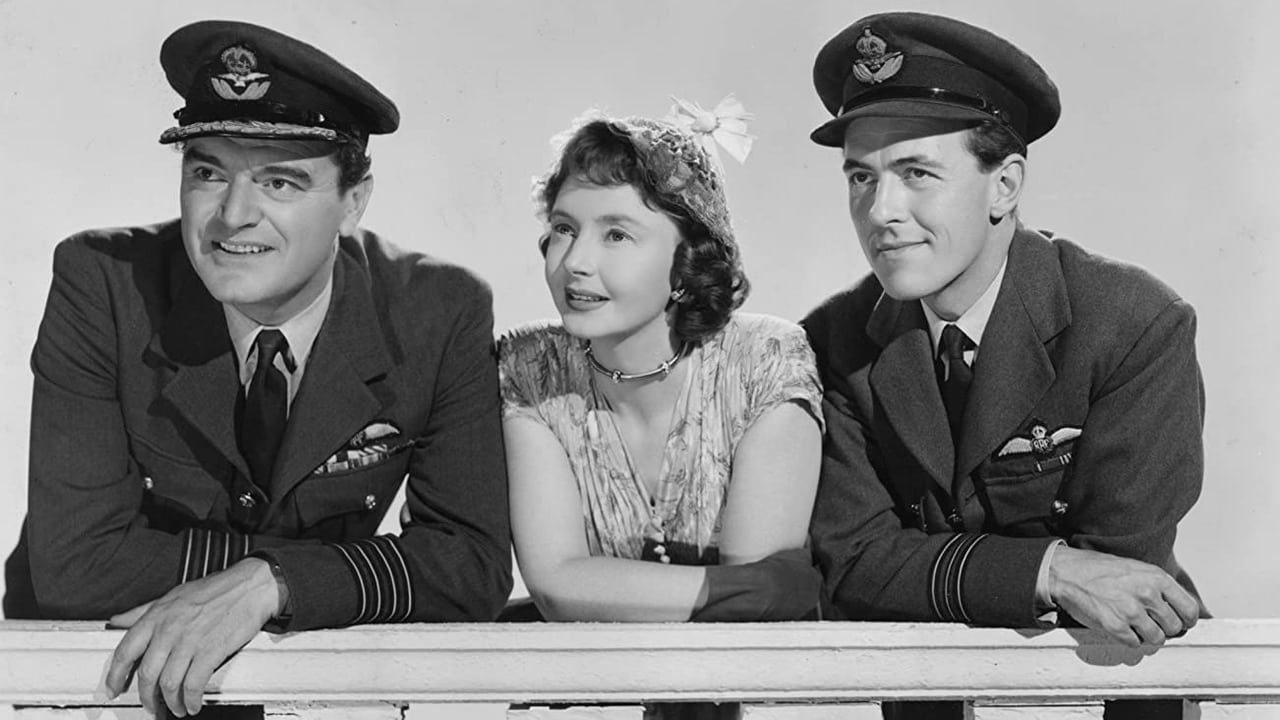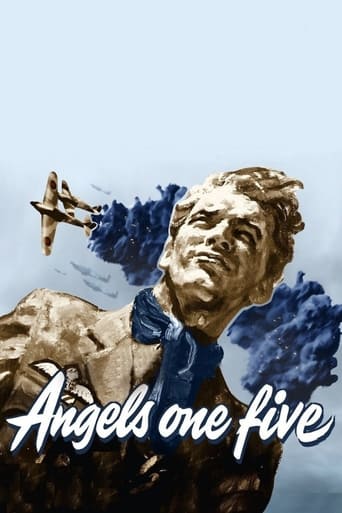

One of a slew of World War II dramas that appeared from British studios at the beginning of the Fifties, ANGELS ONE-FIVE centers on the brief career of T. B. ("Septic") Baird (John Gregson), who joins the Pimpernel Squadron as a tyro pilot, shoots down a German plane but breaks Air Force protocol as a result, but ends up bravely sacrificing his life in an aerial dog-fight against impossible odds.George More O'Ferrall's docu-drama makes some important points about the virtues of teamwork. Led by Peter Moon (Michael Denison), the squadron works as a unit, each member sacrificing personal gain for maximum efficiency. On the ground they enjoy their fair share of joshing - making fun of Baird's penchant for chess - but when called out to battle they set aside their jokes and dedicate themselves to the task in hand, even when they are exhausted. Anyone stepping out of line, such as the mechanic Wailes (Harold Goodwin) is sternly reprimanded.At the head of the entire station stands "Tiger" Small (Jack Hawkins), someone who sets an example of dedication to his men. But he is not without his frailties - during a German raid he rushes to a machine- gun and fires on enemy planes, thereby sacrificing his role as leader. On the other hand he possesses sufficient humanity to understand the importance of leisure-time, which is why we see him supping beer in the officers' mess and trying to make the newbie Baird feel at home.The film reflects the class and gender attitudes of its time, with the largely upper-middle class pilots and the forelock-touching working-classes (Harry Fowler, Victor Maddern) supporting them. The women have largely passive roles, especially Nadine Clinton (Dulcie Gray), whose husband Barrie (Cyril Raymond) controls operations during any raids. Her role is simply to look after the house and provide moral succor where necessary. Other women fulfill more significant roles, especially in the Operations Room, but they remain subservient to Clinton and his male superiors.Some of the lines in Derek Twist's script might seem rather archaic today - especially the determination to preserve stiff upper lips even under the most extreme pressure. On the other hand we cannot deny the cast and director's sincerity of purpose to recreate a time during the Battle of Britain when the Royal Air Force were heavily outnumbered yet still managed to protect the country from obliteration by the Luftwaffe. Nothing was ever easy for them; and they did manage to maintain morale even under the most extreme circumstances.The film's final shot says it all - a view of the ruined Operations Room in the middle of an airfield pockmarked by bomb-craters. Despite the heavy attack, everyone followed Prime Minister Winston Churchill's dictum to keep going on despite every attempt to prevent them.
... View MoreMy first negative review on IMDb - prompted by strong disagreement with the positive reviews "Angels One Five" has on here.I found this to be the worst written British war film I've ever seen - a sophomoric, by-the-numbers "Way to the Stars" rip-off. There's nothing compelling or original about it. The airmen come across as gratingly camp airHEADS. And the film singularly fails to convey either of the portentous bookending Churchill quotations.For propaganda/entertainment purposes, I'd recommend real classics of the genre like "The First of the Few", "The Way to the Stars", "The Dam Busters" or even so-so flicks like "Reach for the Sky" and "Battle of Britain". A disappointing waste of time and talent which is of historical interest/value only.
... View MoreIn a perfect world of course and as it applies to film there would be a definitive film in one genre and no one would bother trying to equal it and leave well enough alone. Alas, we don't live in a perfect world though we DO have a definitive Air Force British movie covering the second world war in the shape of Rattigan's The Way To The Stars which focused more on life on the ground than in the air. Angels One Five stupidly attempts to do the same thing and falls light years short making it more a way to the stairs - even the naughty stair - than to the stars. On the other hand there may well be those who remain ignorant of Rattigan's masterpiece and they will find this highly acceptable despite John Gregson's spot-on impression of a silver birch. Shot in the early fifties there was still enough of England left to capture on film and it must be films like this that inspired the New Left to obliterate it, sadly, where Hitler failed, Tony Blair virtually succeeded.
... View MoreSERIOUS SPOILERS -- be warned! This is a slightly off-beat Battle of Britain film: due either to deliberate decision or budgetary constraint, it focuses on those left behind on the ground when the Spitfires and Hurricanes take off -- the maintenance 'erks', the wives and sisters, the commanders and non-flying officers, and of course the 'Ops Room', with its radar plots and terse jargon. 'Angels One Five' -- friendly aircraft proceed to 15,000 feet...This would be less disconcerting if the film were openly shot as a study of the ground crews of an aerodrome; but it's not. It has its share of airborne sequences, and like its main protagonist, T.B.Baird -- whose unfortunate initials instantly gain him the nickname of 'Septic' -- the viewer constantly assumes that the *real* action in the skies is just about to begin. Labouring under a sense of injustice with which we are by and large induced to sympathise, Baird can't wait to get out of the Ops Room and onto more active duties. But when he does seize an unauthorised chance to fly in defence of the station itself and 'bags' an enemy aircraft, he commits a potentially lethal error; there is a very effective sequence deflating his heroics when it becomes clear just what he has done.The film often seems to work to subvert our expectations in this way, sometimes to comic and sometimes to shocking effect: when Baird finally gets into the air, all seems set for a conventional finale, with the defeat of the Luftwaffe ahead and promotion for our hero after the sad demise of his flight commander. But there is nothing so glorious in store. The same ignominious ambush that brought his leader down proves to have mortally wounded both Baird and his plane -- and the last we witness of his fate, from the Ops Room as always, is the gradually ebbing radio transmissions that mark his end. With another aircraft nursing him down and all resources at base turned to tracking his path, we automatically await a last-minute triumph over disaster... and are caught yet again off-balance.With a record like this, the film ought to be outstandingly original in its impact: yet, somehow, it isn't. Individual scenes are noteworthy indeed, but overall it left me with a strangely unsatisfactory impression. Its only real claim to 'shape' would be as Baird's own story, but its focus is too general for that -- yet it spends too much of its time following Baird to make sense as a story of the station at RAF Neetham itself. The end result seems to be a film without a clear idea of where it's going and missing some central sense of purpose.It's not a story of the futility of war; it's not a story of heroic sacrifice; it's not the story of one individualist coming to acknowledge the contributions of his colleagues; it's not a story of the horrors of responsibility in wartime. But while avoiding all these perhaps clichéd themes, it doesn't really come up with an overarching narrative of its own. The material has potential, but somehow the outcome is less effective than it might have been.
... View More